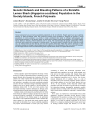Human pressures have put many top predator populations at risk of extinction. Recent years have seen alarming declines in sharks worldwide, while their resilience remains poorly understood. Studying the ecology of small populations of marine predators is a priority to better understand their ability to withstand anthropogenic and environmental stressors. In the present study, we monitored a naturally small island population of 40 adult sicklefin lemon sharks in Moorea, French Polynesia over 5 years. We reconstructed the genetic relationships among individuals and determined the population’s mating system. The genetic network illustrates that all individuals, except one, are interconnected at least through one first order genetic relationship. While this species developed a clear inbreeding avoidance strategy involving dispersal and migration, the small population size, low number of breeders, and the fragmented environment characterizing these tropical islands, limits its complete effectiveness.
Liste




 English
English